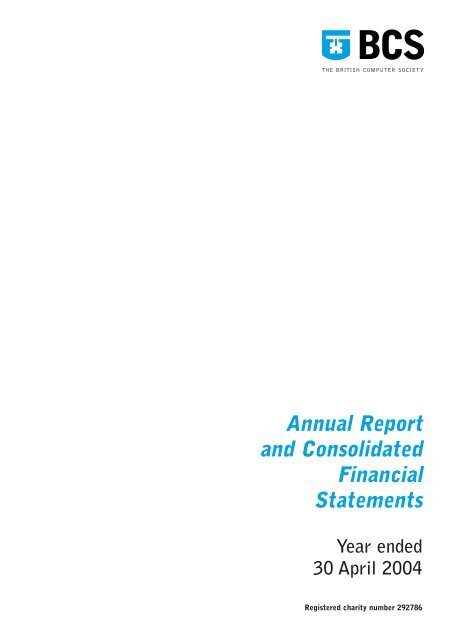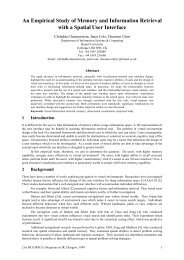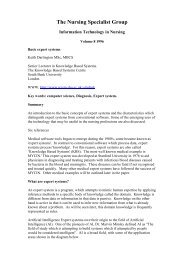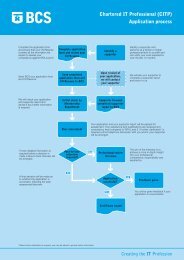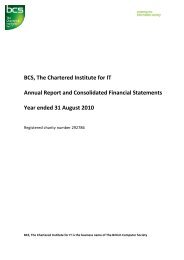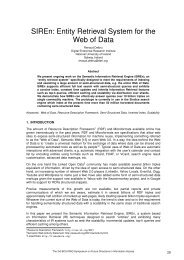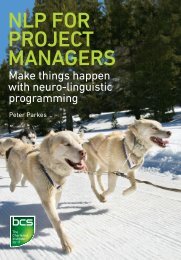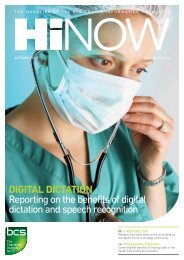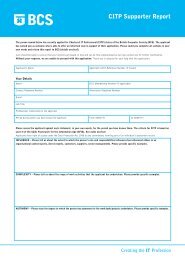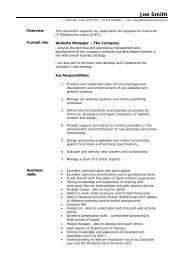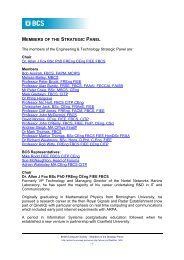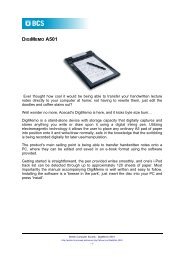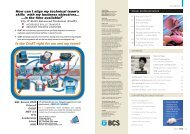You also want an ePaper? Increase the reach of your titles
YUMPU automatically turns print PDFs into web optimized ePapers that Google loves.
Annual Report<br />
and Consolidated<br />
Financial<br />
Statements<br />
Year ended<br />
30 April 2004<br />
Registered charity number 292786
Index<br />
Page No<br />
OFFICERS, DISTINGUISHED FELLOWS AND EXECUTIVES............................................... 1<br />
PRESIDENT’S REPORT........................................................................................................... 2<br />
CHIEF EXECUTIVE’S REPORT............................................................................................... 4<br />
TRUSTEE REPORT.................................................................................................................. 5<br />
1. STRUCTURE ............................................................................................................. 5<br />
2. ACTIVITY REPORTS................................................................................................. 6<br />
3. FINANCE OVERVIEW (INCLUDING POLICY STATEMENTS).............................. 10<br />
INDEPENDENT AUDITOR’S REPORT TO THE TRUSTEES OF<br />
THE BRITISH COMPUTER SOCIETY ................................................................................... 13<br />
CONSOLIDATED STATEMENT OF FINANCIAL ACTIVITIES ............................................. 14<br />
SOCIETY STATEMENT OF FINANCIAL ACTIVITIES .......................................................... 16<br />
CONSOLIDATED CASH FLOW STATEMENT...................................................................... 18<br />
NOTES .................................................................................................................................... 20
<strong>The</strong> <strong>British</strong> <strong>Computer</strong> <strong>Society</strong><br />
OFFICERS, DISTINGUISHED FELLOWS AND EXECUTIVES<br />
PATRON HRH <strong>The</strong> Duke of Kent KG GCMG GC ADC FREng<br />
TRUSTEE BOARD �<br />
President Past President - N G McMullen CEng F<strong>BCS</strong> CITP<br />
W Hall CBE FREng CEng F<strong>BCS</strong> CITP P S Barnes CEng M<strong>BCS</strong> CITP R J Jardine CEng M<strong>BCS</strong> CITP<br />
Deputy President D Basu F<strong>BCS</strong> CITP R G Johnson CEng F<strong>BCS</strong> CITP<br />
D Morriss CEng F<strong>BCS</strong> CITP A J Beasley CEng F<strong>BCS</strong> CITP S Kay CEng M<strong>BCS</strong> CITP<br />
Vice-President Products & Services L A Beddie CEng M<strong>BCS</strong> CITP 2<br />
S F M Keddie M<strong>BCS</strong> CITP<br />
M D Allen F<strong>BCS</strong> CITP D A Bell CEng F<strong>BCS</strong> CITP L Keighley CEng F<strong>BCS</strong> CITP<br />
Vice-President Finance S E Black M<strong>BCS</strong> CITP J E McLean M<strong>BCS</strong> CITP<br />
J K Nix F<strong>BCS</strong> CITP A S Brown M<strong>BCS</strong> 3<br />
R A Newell F<strong>BCS</strong> CITP<br />
Vice-President External Relations P J Coats CEng M<strong>BCS</strong> CITP J M Roberts CEng M<strong>BCS</strong> CITP<br />
B S Collins CEng F<strong>BCS</strong> CITP M G Cullen CEng F<strong>BCS</strong> CITP P E Ross CEng M<strong>BCS</strong> CITP<br />
Vice-President Forums A J Fox CEng F<strong>BCS</strong> CITP 2<br />
M Ross CEng F<strong>BCS</strong> CITP<br />
R H A Burnett F<strong>BCS</strong> CITP T A Freedman M<strong>BCS</strong> CITP E K Somogyi F<strong>BCS</strong> CITP<br />
Vice-President Knowledge Services M A Garvey M<strong>BCS</strong> CITP M B Stranks CEng F<strong>BCS</strong> CITP<br />
N R Shadbolt F<strong>BCS</strong> CITP G Gee M<strong>BCS</strong> CITP C J I Stuart M<strong>BCS</strong> CITP<br />
Vice-President Member Services<br />
K R G Harper CEng F<strong>BCS</strong> CITP C J White CEng M<strong>BCS</strong> CITP<br />
C E Hughes CEng F<strong>BCS</strong> CITP S I Herbert M<strong>BCS</strong> CITP J Yip CEng F<strong>BCS</strong> CITP<br />
Vice-President Qualifications & Standards<br />
J G Chapman CEng F<strong>BCS</strong> CITP<br />
D Holdsworth CEng F<strong>BCS</strong> CITP A J Young CEng M<strong>BCS</strong> CITP<br />
Immediate Past President<br />
J L Ivinson F<strong>BCS</strong> CITP<br />
Council Representative<br />
D Anketell CEng F<strong>BCS</strong> CITP<br />
Council Representative PAST PRESIDENTS<br />
R K Baker F<strong>BCS</strong> CITP<br />
Council Representative 2002/03 J L Ivinson 1980/81 F J Hooper CEng<br />
R A McLaughlin CEng F<strong>BCS</strong> CITP 2001/02 N G McMullen CEng 1979/80 J L Bogod<br />
Council Representative 2000/01 A J P Macdonald CB 1978/79 F H Sumner<br />
B McManus CEng F<strong>BCS</strong> CITP 1999/00 D F Hartley CEng 1977/78 P A Samet CEng<br />
Council Representative 1998-99 I C Ritchie CBE CEng FREng FRSE 1976/77 G A Fisher<br />
F B Moran F<strong>BCS</strong> CITP 1997/98 Sir Brian Jenkins GBE 1975/76 C P H Marks*<br />
1996/97 R J McQuaker CEng* 1974/75 E L Willey<br />
� Members of Council and continuing Trustees 1995/96 G W Robinson CBE FREng 1973/74 R L Barrington<br />
1994/95 D W Mann CEng 1972/73 G J Morris CEng<br />
1993/94 J P Leighfield CBE 1971/72 A S Douglas CBE CEng<br />
1992/93 R G Johnson CEng 1970/71 A d’Agapeyeff OBE *<br />
1991/92 S C T Matheson CB 1969/70 <strong>The</strong> Earl of Halsbury FRS FREng*<br />
1990/91 A R Rousell 1968/69 B Z de Ferranti*<br />
1989/90 Dame Stephanie Shirley DBE CEng 1967/68 S Gill*<br />
1988/89 B W Oakley CBE 1966/67 <strong>The</strong> Earl Mountbatten of<br />
1987/88 E P Morris TD Burma KG PC OM*<br />
1986/87 Sir John Fairclough FREng * 1965/66 Sir Maurice Banks*<br />
1985/86 R A McLaughlin CEng 1963/65 Sir Edward Playfair KCB*<br />
1984/85 E S Page CEng 1962/63 R L Michaelson*<br />
EXECUTIVE BOARD 1983/84 D Firnberg 1961/62 D W Hooper*<br />
1982/83 HRH <strong>The</strong> Duke of Kent KG 1960/61 F Yates CBE FRS*<br />
Chief Executive GCMG GC ADC FREng 1957/60 Sir Maurice Wilkes FRS FREng<br />
D Clarke<br />
Deputy Chief Executive<br />
C J Thompson<br />
1981/82 P D Hall OBE CEng<br />
* deceased<br />
Director, Qualification Products<br />
P Bayley<br />
DISTINGUISHED FELLOWS<br />
Director of External Relations, G M Amdahl Sir Antony Hoare KBE FRS<br />
Knowledge Services & Forums C W Bachman P T Kirstein CBE FREng<br />
M Rodd CEng F<strong>BCS</strong> CITP I M Barron CBE D E Knuth<br />
Finance Director Sir Tim Berners-Lee KBE FREng FRS A J R G Milner FRS FRSE<br />
P L Jones FCA M<strong>BCS</strong> F P Brooks FREng W M Turski FREng<br />
IT Director D Deutsch Sir Maurice Wilkes FRS FREng<br />
J Orton M<strong>BCS</strong> CITP W H Gates III R Wilmot OBE<br />
1 of 32<br />
MEMBERS OF COUNCIL 1<br />
1 Trustees until 30 April 2004 3 Not a Trustee<br />
2 Retired 30 April 2004
<strong>The</strong> <strong>British</strong> <strong>Computer</strong> <strong>Society</strong><br />
PRESIDENT’S REPORT<br />
Anyone who is honoured with the role of <strong>BCS</strong> President for the year can be assured of a hectic period<br />
of enormous activity. I can vouch for this as I come towards the end of my presidential term. <strong>The</strong> year<br />
began with the <strong>BCS</strong> Annual Dinner. Our guest of honour at the Intercontinental Hotel, Park Lane, was<br />
the highly amusing broadcaster Sandy Toksvig, who had us roaring with laughter. I was delighted that<br />
she began my term of office with a reminder to our predominantly male audience that women are a<br />
force to be reckoned with, even in IT! Raising the profile of women in IT has been one of my main aims<br />
during my presidential year. I have tried throughout the year to invite high profile women to share the<br />
platform with me to celebrate the role of women in our community.<br />
My other main aims have been to focus on the role of <strong>BCS</strong> as a ‘learned society in the 21st century’,<br />
and to support the <strong>Society</strong> in its quest to increase professionalism in IT. So many things have<br />
happened this year that it is hard to record them all in this report. So I will mention just some of them to<br />
illustrate what a varied and interesting year it has been.<br />
A key item early in my calendar was to announce the results of the ballot on the new <strong>BCS</strong> membership<br />
criteria. Although we all felt pretty confident that we would persuade our members that a broader<br />
membership was not only important for the IT profession generally but for the long term prosperity and<br />
success of the <strong>Society</strong>, we still awaited the result with bated breath. Success! Over 90 percent of votes<br />
by the membership were in favour of the new changes, which means that <strong>BCS</strong> is at last relevant to the<br />
majority of the IT profession, rather than just the minority.<br />
<strong>The</strong> New Year started with Professor Fred Piper’s Turing Lecture at the IEE. Fred focussed on peoples<br />
worries about cyber-security. Perceived weaknesses were cited as threatening society and inhibiting ecommerce.<br />
Yet every advance intended to protect the 'good guys' from the 'bad guys' can work in<br />
reverse. His broad interest lecture examined the social and political implications of 'misuse' and<br />
considered some technical solutions. As ever this was a tremendously successful event.<br />
A lot of hard work has gone into the creation and promotion of the activities of the recently formed UK<br />
<strong>Computer</strong> Research Committee (UKCRC). In collaboration with UKCRC and the Council of Professors<br />
and Heads of Computing (CPHC), <strong>BCS</strong> sponsored a Grand Challenges in Computing conference in<br />
Newcastle in March 2004. This attracted a huge cross section of <strong>British</strong> computer scientists, as well as<br />
some key figures from Europe and the USA. It was also a privilege to present the newly created Roger<br />
Needham Award at the conference to Jane Hillston from the University of Edinburgh, who is the creator<br />
of a revolutionary new software modelling language that predicts performance related problems at<br />
software design stage.<br />
In March it was announced that the Prime Minister had appointed me, alongside 15 others, to his<br />
Council for Science and Technology, the Government's top-level advisory body on science, engineering<br />
and technology policy. This was a real mark of recognition, not just for me but also for the <strong>Society</strong>. This<br />
announcement coincided with the launch of a new initiative for <strong>BCS</strong>, our Thought Leadership Dinners.<br />
<strong>The</strong>se are rapidly becoming one of the most sought after invitations in town! We invite experts in a<br />
particularly controversial or new area related to IT to attend a dinner to discuss that subject whilst<br />
enjoying their meal. Rapporteurs at each table report back in plenary session after the dinner, and<br />
contribute to the final report. This serves to inform <strong>BCS</strong> on the subject and helps foster networking in<br />
new areas. <strong>The</strong>se dinners are proving very popular and have already attracted sponsorship. We are<br />
planning many more of them.<br />
Another great social evening, the type that <strong>BCS</strong> excels in, is the annual Lovelace Lecture. It was given<br />
this year by Dr John Warnock, co-founder of Adobe, and at the lecture I was able to present him with<br />
the Lovelace Medal, which is given to individuals for making a significant contribution to the<br />
advancement, or the understanding, of information technology.<br />
2 of 32
<strong>The</strong> <strong>British</strong> <strong>Computer</strong> <strong>Society</strong><br />
President’s Report (continued)<br />
<strong>The</strong> <strong>BCS</strong> was honoured again at a reception at the Dali Universe in London to mark our new<br />
membership launch. Sir Peter Gershon and Lord Sainsbury graced the occasion with their presence<br />
and televised support respectively. Both highlighted the need for increased professionalism in IT and<br />
discussed what <strong>BCS</strong>’s role in such an initiative might be. It is really good to see <strong>BCS</strong> now being treated<br />
with real recognition within government circles after all the hard work that has been put in over so many<br />
years.<br />
As is the case for most Presidents, much of my year has also been given over to supporting the work<br />
and activities carried out by our Specialist Groups and Branches. I attended both of their annual<br />
congresses and assemblies as well as doing more than my usual amount of travelling around the<br />
country but being royally treated nevertheless wherever I visited. I have enjoyed these visits very much<br />
as it has given me tremendous insight into the many and varied activities of our members.<br />
I have thoroughly enjoyed my Presidential year and I now appreciate even more the enormous amount<br />
of hard work that goes on behind the scenes by the staff at HQ. My year started with a major social<br />
event, and it will come to a close with another one, namely the <strong>BCS</strong> IT Awards Dinner. If last year’s<br />
dinner is anything to go by this will be a spectacular evening, and I look forward to announcing the<br />
winners of the new award we have established this year for the company or organisation that has done<br />
the most to support women in IT. This will be a fitting end to a memorable year.<br />
W Hall<br />
President<br />
28 July 2004<br />
3 of 32
<strong>The</strong> <strong>British</strong> <strong>Computer</strong> <strong>Society</strong><br />
CHIEF EXECUTIVE’S REPORT<br />
<strong>The</strong> last year has again been a tremendously challenging and rewarding year for the <strong>Society</strong>. Following<br />
the approval of our changes to governance and membership late in 2003, the first half of 2004 has been<br />
heavily focussed on implementation.<br />
<strong>The</strong> changes to the Charter and Bye-laws, approved by both Privy Council and Membership have<br />
introduced the new Chartered IT Professional (CITP) qualification and enabled the recruitment process<br />
for other grades, including M<strong>BCS</strong>, to be radically improved allowing processing of applications and<br />
awarding M<strong>BCS</strong> to become immediate. This achieves our aims of both being inclusive to all relevant<br />
members and at the same time providing an efficient service - yet still retaining our gold standard<br />
Chartered Levels.<br />
To give you some idea of the success of the membership changes to date, like most institutions our<br />
membership has been flat since its peak in 1994. In fact many institutions have been losing members at<br />
a considerable rate in recent years, though thankfully we have maintained our total numbers. Our<br />
target for the new financial year for new members is an additional 10,000 members, which is seen by<br />
many people as extraordinarily ambitious, but if the first few weeks are anything to go by we will<br />
certainly make this number.<br />
<strong>The</strong> funding for the <strong>Society</strong> comes predominantly from our IT certification products businesses. This<br />
year over 80% of our revenue came from these areas, principally ECDL, ISEB, <strong>BCS</strong> Professional<br />
Products and <strong>BCS</strong> Exams. <strong>The</strong> IT Training market, has had a difficult time in the last three years,<br />
reducing cumulatively in that time by 30%, back to the levels we saw in 1996, and if you allow for<br />
inflation, 1995; and we have been seeing increasing competition in our key markets in the last two<br />
years. Despite all of this, we have grown our overall product revenues by 16% this year to over £15<br />
million, and also achieved our planned net surplus of 5%. In addition we are starting to see real inroads<br />
from our investment in ICDL Asia Pacific Limited.<br />
We have achieved these results whilst continuing to invest substantial amounts of money to make sure<br />
our income continues to grow into the future. We have launched 15 new products this year, and have<br />
over 40 new products in development.<br />
Our approach to drive improved “Professionalism in IT” which has evolved over the last eighteen<br />
months to colour much of our thinking, has proved incredibly successful at opening doors in all sorts of<br />
directions. Our press profile has never been higher, we currently stand at no 37 in the PRA rating for IT<br />
organisations, (we weren’t in the top 250 two years ago) and we are constantly receiving requests from<br />
government and industry to participate in a whole variety of IT related activities. We have built an<br />
excellent response process to manage these requests, with my staff handling the process and the world<br />
class knowledge of our members providing the content.<br />
During the last twelve months, we have been redeveloping the concept of a “Learned <strong>Society</strong> for the<br />
21 st Century” We believe this should be about leading the thinking about where information technology<br />
in all of its aspects will be going in the future. Together with the Council of Professors and Heads of<br />
Computing (CPHC), we hosted a tremendously successful conference in Gateshead in April 2004 on<br />
the future “Grand Challenges in Computing”.<br />
We have also developed a series of “Thought Leadership” debates amongst key influencers on a whole<br />
series of IT related topics, which are again leading the thinking in the development of IT policies and<br />
directions for the future.<br />
We have a feeling in the <strong>Society</strong> of making real progress in many areas of our organisation, and are<br />
having some fun doing it.<br />
D Clarke<br />
Chief Executive<br />
28 July 2004<br />
4 of 32
<strong>The</strong> <strong>British</strong> <strong>Computer</strong> <strong>Society</strong><br />
TRUSTEE REPORT<br />
1. Structure<br />
<strong>BCS</strong> is the Institution for Information Technology Professionals, established in 1957 and incorporated<br />
under Royal Charter in 1984. <strong>The</strong> <strong>Society</strong>’s registered charity number is 292786.<br />
<strong>The</strong> <strong>Society</strong>’s objectives are prescribed by the Royal Charter; the main objective is ‘to promote the<br />
study and practice of computing and to advance the knowledge and education therein for the benefit of<br />
the public’. It serves three main constituencies: IT professionals, employers of IT professionals and<br />
society at large, and its governing documents are the Royal Charter, Bye-laws and Regulations.<br />
Approval of the governance and membership criteria changes were approved at the Extraordinary<br />
General Meeting in September 2003 by the Privy Council in November 2003. <strong>The</strong>se changes were<br />
effective from 1 May 2004 when the trusteeship of <strong>BCS</strong> passed from Council to the Trustee Board. <strong>The</strong><br />
continuing function of Council is to provide support to the Trustee Board in an advisory capacity and to<br />
approve the appointment of Honorary Officers.<br />
Trustee Board delegates much of the strategic work of the <strong>Society</strong>'s key activities to Boards,<br />
Committees, Expert Panels and Strategic Panels. Each Board is normally chaired by a Vice-President,<br />
and also includes a senior member of HQ staff appointed by the Chief Executive. <strong>The</strong> Boards adopt<br />
and progress programmes of work in their respective areas to meet the <strong>Society</strong>'s objectives.<br />
Lists of Council Members, all of whom were the trustees of the <strong>Society</strong> up to 30 April 2004 and the<br />
Trustee Board Members who are the trustees from 1 May 2004, are included on page 1. Trustees are<br />
elected to office in accordance with the Bye-laws by the Professional Membership and by Council itself.<br />
Trustees are precluded from receiving remuneration from the <strong>Society</strong>, except when acting as examiner<br />
for professional exams.<br />
<strong>The</strong> <strong>Society</strong> works through a set of Boards and Committees whose responsibility transferred from<br />
Council to Trustee Board on 1 May 2004 and which have delegated authorities. <strong>The</strong>se in turn have<br />
subsidiary committee structures appropriate to their areas of work.<br />
KEY BOARDS AND COMMITTEES OF TRUSTEE BOARD<br />
Forums Board Development of Forum activities and overview of the<br />
current three Forums – Education & Training,<br />
Engineering & Technology and Management.<br />
External Relations Board External representation and employer liaison.<br />
Knowledge Services Board Development and dissemination of knowledge about IT<br />
and its application to the IT professional community.<br />
Member Services Board Provision of relevant information and services to<br />
members and other interested parties (includes<br />
overview of Specialist Groups and Branches).<br />
Products & Services Board Operational review and monitoring of the <strong>Society</strong>’s<br />
portfolio of products and services including ECDL,<br />
ISEB, Professional Products, Publications and<br />
Membership Services.<br />
Qualifications & Standards Board Professional admissions, accreditation and<br />
development.<br />
Audit Committee Review of audit and risk management.<br />
5 of 32
<strong>The</strong> <strong>British</strong> <strong>Computer</strong> <strong>Society</strong><br />
Trustees Report (continued)<br />
<strong>The</strong> administration of the <strong>Society</strong> is undertaken by a full-time executive staff based at the <strong>Society</strong>’s<br />
registered office in Swindon. <strong>The</strong> <strong>Society</strong> also maintains offices in London, which are used primarily for<br />
meetings.<br />
At the <strong>Society</strong>’s Annual General Meeting in October 2003 the 2002/2003 Annual Report and Accounts<br />
were adopted, 13 new Council Members were elected, and the Auditors were re-appointed for the fiscal<br />
year 2003/2004. Membership subscription rates were also approved for the year 2004/2005.<br />
<strong>The</strong> <strong>Society</strong>’s membership at 30 April 2004 and 2003 is shown below:<br />
Number of Members<br />
2004 2003<br />
Fellows 1,348 1,329<br />
Members 24,809 15,483<br />
Associate members 229 1,652<br />
Companions 20 22<br />
Students 7,402 8,972<br />
Graduates - 7,322<br />
Affiliates 3,020 3,604<br />
36,828 38,384<br />
<strong>The</strong> change in profile reflects the grade changes during the year. <strong>The</strong>re was a small reduction in<br />
numbers during the last twelve months due to a hold on promoting and seeking new applications<br />
pending the launch of the new membership structure on 1 May 2004. As noted by the Chief Executive,<br />
the growth in numbers has dramatically taken off since 1 May 2004 with over 2,000 new members<br />
recruited during May/June 2004.<br />
2. Activity Reports<br />
A review of the activities of the <strong>Society</strong> is included in the President and Chief Executive’s Reports on<br />
pages 2 to 4.<br />
A summary of the activity of each individual Board is described by the relevant Vice-President below:<br />
Forums Board<br />
Vice-President Rachel Burnett<br />
<strong>The</strong> primary importance of each Forum lies in its ability to act strategically as a source of professionally<br />
recognised expertise in its particular sector, both in ensuring that the <strong>Society</strong> meets the concerns of its<br />
members in that sector and in driving the outward-facing role of the <strong>Society</strong>.<br />
<strong>The</strong> Forums Board co-ordinates the ideas and views developed in the Forums, and the work which<br />
results, to facilitate implementation, and as a channel of communication to Council and the Trustee<br />
Board. It will drive the Forums forward, ensuring their relevance and continuing contribution to the<br />
overall success of the <strong>Society</strong>.<br />
<strong>The</strong>re are currently three Forums whose Strategic Panels report to the Forums Board through the<br />
Forum Chairs:<br />
• Education & Training<br />
• Engineering & Technology<br />
• Management.<br />
6 of 32
<strong>The</strong> <strong>British</strong> <strong>Computer</strong> <strong>Society</strong><br />
Trustees Report (continued)<br />
Education and Training Forum<br />
<strong>The</strong> Chair of the Education and Training Strategic Panel is Lesley Beddie<br />
“<strong>The</strong> Education and Training sectors are recognised by the <strong>Society</strong> as crucial to its future and that of<br />
computing professionals. We have established the Forum to work for the people in both these important<br />
communities, which have a huge part to play in the support, instruction, and ongoing development of<br />
computing professionals. <strong>The</strong> Forum has already ensured that the work of education and training<br />
professionals in IT is incorporated into the Industry Structure Model. We will be setting up our Strategic<br />
Panel over the next few months, and I’m glad to say that I will be helped in this by Gillian Lovegrove as<br />
Interim Forum Manager.<br />
Several <strong>BCS</strong> Specialist Groups address spheres of interest which are clearly closely related to the<br />
Education and Training area. In fact it could be argued that they all do as they all address either an<br />
aspect of learning/research or management/delivery of IT in the sectors! It is important that we work<br />
with the Groups, which all count people who work in the Education and Training sector amongst their<br />
members, to develop jointly new resources both for them and <strong>BCS</strong> members.<br />
This Forum will work in partnership with other bodies or groups, and with other individuals and is<br />
responsible for our very active Schools Expert Panel.”<br />
Engineering and Technology Forum<br />
<strong>The</strong> Chair of the Engineering and Technology Strategic Panel is Dr Allan Fox.<br />
“<strong>The</strong> primary focus of our Forum’s Strategic Panel lies in the challenge of developing high consequence<br />
computing systems with their technological challenge to the computing supply industry and their<br />
extreme importance to many of the key engineering industries in the UK. In particular the Forum is<br />
responsible for the <strong>BCS</strong> Safety Critical Systems Expert Panel which is supported jointly by the IEE. This<br />
Panel seeks to raise Government awareness of this important societal concern as well as developing<br />
an insight into available technological support.<br />
Over the past few months as Chair of the Forum, together with my immediate predecessor Professor<br />
John McDermid, we have been deeply involved in the joint <strong>BCS</strong>/Royal Academy of Engineering working<br />
party report into the “Challenges of Complex IT Projects”; this authoritative report was in part funded by<br />
the Engineering and Technology Forum. Certainly the Report’s widespread and public acceptance by<br />
such key figures as Sir Peter Gershon of the Office of Government Commerce is a good example of<br />
how the Forum can be influential.”<br />
Management Forum<br />
<strong>The</strong> Chair of the Management Strategic Panel is Gill Ringland.<br />
“Our mission is to represent IT Managers, working with other representation bodies where appropriate.<br />
We aim to do this by improving the overall quality and professionalism of IT Management, providing<br />
improved support to managers who are closely associated with IT and/or given responsibility for<br />
directing IT and making the <strong>BCS</strong> the first port of call for government and industry leaders/market<br />
makers on all IT Management issues.<br />
We have set up the Strategic Panel, which had its first meeting on 22 April 2004. This meeting was very<br />
successful with much discussion and several ideas put forward for research and implementation being<br />
followed through.<br />
<strong>The</strong>re are several <strong>BCS</strong> Specialist Groups whose spheres of interest are clearly in the IT management<br />
area. <strong>The</strong>se are: Business Information Systems, Business-IT Interface, Consultancy, Financial<br />
Services, ICC, Law, PROMS-G, Quality, Sociotechnical and SPIN. We plan to work with them to<br />
develop activities of interest to IT managers.”<br />
7 of 32
<strong>The</strong> <strong>British</strong> <strong>Computer</strong> <strong>Society</strong><br />
Trustees Report (continued)<br />
External Relations Board<br />
Vice-President Professor Brian Collins<br />
“At an Organisational level members of the External Relations Board (ERB), with the Senior Officers,<br />
directly represent the <strong>Society</strong>. <strong>The</strong> Board co-ordinates members’ interactions with other bodies through<br />
the other Vice-Presidents and provides advice and guidance and annual communication sessions for<br />
members with links to bodies such as EURopean InforMation <strong>Society</strong> Group (EURIM) and the<br />
International Federation for Information Processing (IFIP).<br />
We maintain a dialogue with Ministers, MPs and Senior Officials in departments with an IT related<br />
responsibility. Among these are the Department of Trade and Industry (DTI), Department for Education<br />
and Skills (DfES), Office of Government Commerce (OGC), Department of Health (DoH) and the<br />
eEnvoy. We are active in EURIM and the Parliamentary IT Committee (PITCOM), the forums for<br />
government/industry liaison. <strong>The</strong>se activities are overseen by the Government Relations Group.<br />
We are developing relationships with major employers and their representative bodies such as Intellect.<br />
A good example of this is the IT for Communities (IT4C) initiative, which also includes the Worshipful<br />
Company of Information Technologists (WCIT) and Business in the Community.<br />
We also work with other membership bodies. As well as bilateral cooperation with these organisations,<br />
the <strong>Society</strong> was instrumental in founding the IT Strategy Forum, chaired by past President Sir Brian<br />
Jenkins, which has brought all these bodies together to cooperate on issues of mutual interest.<br />
Internationally we work through the Council of European Professional Informatics Societies (CEPIS)<br />
and IFIP, as well as being members of the European <strong>Computer</strong> Driving Licence (ECDL) Foundation.”<br />
Knowledge Services Board<br />
Vice-President Professor Nigel Shadbolt<br />
“Knowledge Services Board (KSB) exists to support the development and dissemination of all forms of<br />
knowledge about IT and its applications. <strong>The</strong> audience for this knowledge includes the IT professional<br />
community, IT users and organisations, both education and research communities. Importantly KSB<br />
strives to encompass both the Professional and Learned <strong>Society</strong> roles of the <strong>BCS</strong>.<br />
Its current initiatives include; advising the new Products and Services Board on the strategic direction of<br />
its procurement of titles, working with the <strong>BCS</strong> IT Director to help develop our web and IT infrastructure<br />
so that we can offer the services needed to communicate information and content about IT in a timely<br />
and attractive manner, developing taxonomies that will describe areas of research, business activity and<br />
members skills, establishing a Learned <strong>Society</strong> Awards committee to oversee a number of prestigious<br />
awards.”<br />
Member Services Board<br />
Vice-President Charles Hughes<br />
“Member Services Board (MSB) brings together the important issues of member recruitment, retention<br />
and engagement. It measures and monitors member attitudes and aspirations and ensures information<br />
and services are directed to meet member needs. MSB is building on the successful networks of<br />
Branches, Specialist Groups and Young Professionals, which together with a range of first class<br />
products and services add significant value to all members.<br />
Specialist Groups<br />
<strong>The</strong> 50+ <strong>BCS</strong> Specialist Groups are formed by groups of individuals who share a common interest in<br />
some specific aspect of IT, its application, and/or its bearing on other professional disciplines or society<br />
at large. <strong>The</strong> SGs exemplify a time-honoured mechanism for supporting physical and electronic<br />
networking among members, both within the UK and internationally, covering areas as diverse as<br />
Health Informatics, Natural Language Translation and Financial Services.<br />
8 of 32
<strong>The</strong> <strong>British</strong> <strong>Computer</strong> <strong>Society</strong><br />
Trustees Report (continued)<br />
SGs undertake a variety of activities, including regular meetings for the delivery of papers, discussion<br />
groups, interactive workshops, or simply the provision of opportunities for the members to get together<br />
for professional networking. SGs also organise conferences (either local or international), instigate<br />
working parties to study specific aspects of current topics within its scope, or produce position<br />
statements and prepare technology surveys.<br />
Branches and International Sections<br />
Our 40 UK Branches and 13 International Sections provide an important networking service for our<br />
members. <strong>The</strong>y hold regular meetings in their area, on a diverse range of IT and IT-related topics, as<br />
well as arrange company visits/presentations, workshops and networking events. Some groups<br />
maintain links with schools, colleges and universities and get involved in careers fairs, competitions and<br />
prize giving. Over the past year topics covered have ranged from ‘<strong>Computer</strong> Forensics' and the<br />
'Semantic Web' to 'Developments in Data Protection and Freedom of Information' with high profile<br />
speakers such as Russell May, the former Head of Hi Tech Crime Unit, and Richard Thomas, the<br />
Information Commissioner.<br />
Other events included live programming robotic performances by Steve Grande OBE, schools<br />
competitions, the Belfast Branch IT Professional of the Year Award, and the annual, high profile<br />
Birmingham Branch IT Security Conference.<br />
Young Professionals Group (YPG)<br />
<strong>The</strong> Young Professionals Group (YPG) provides representation, services and a support network to all<br />
<strong>BCS</strong> members under the age of 35. As one of the largest member groups in the <strong>BCS</strong>, the membership<br />
body of the YPG is diverse, representing over 15,000 young IT professionals from many countries: all at<br />
varying stages of their careers and with a wide breadth of skills and specialisations. YPG members<br />
represent young IT professionals at many high-profile events around the UK and, at a local level,<br />
organise events in universities and Branches of relevance to young professionals.”<br />
Products and Services Board<br />
Vice-President Mike Allen<br />
“<strong>The</strong> formation of the Products and Services Board (PSB) is a recent development, approved by<br />
Council in September 2003. PSB will adopt sound business practices to manage the <strong>Society</strong>'s portfolio<br />
of products and services, including establishing priorities and approving investment plans to achieve<br />
this.<br />
Its specific objectives are:<br />
• To carry out a constant review of the products and services portfolio within the scope of the<br />
<strong>Society</strong>'s activities, and identify gaps and duplications in the products areas<br />
• To manage the lifecycles of the individual product and service activity and performance.<br />
<strong>The</strong> setting up of PSB is a key mechanism in ensuring that <strong>BCS</strong> investment in new products and<br />
services delivers value for money for our members and secures our income streams for the future. It is<br />
a big challenge but one on which we and the Swindon team have made a good start. Success will<br />
depend on the application of sound business practices and ensuring that the products and services are<br />
relevant to the IT community and society."<br />
9 of 32
<strong>The</strong> <strong>British</strong> <strong>Computer</strong> <strong>Society</strong><br />
Trustees Report (continued)<br />
Qualifications and Standards Board<br />
Vice-President John Chapman<br />
“<strong>The</strong> role of the Qualifications and Standards Board (QSB) is to:<br />
• establish and maintain the standards for education, competence and conduct of IT practice<br />
• promote adequate provision of education and training to allow practitioners to develop and<br />
maintain effective careers<br />
• provide mechanisms and related quality assurance to review the performance of individuals<br />
in relation to standards<br />
• provide mechanisms to review appeals against the decisions related to performance.<br />
It is our aim to see a <strong>BCS</strong> that is respected by its members, industry, academia and government for the<br />
contribution it makes in moving IT forward, the expertise of its members, staff and publications and the<br />
overall value it adds to society.<br />
QSB have three major objectives in the following areas:<br />
• Skills - how do we ensure that IT people stay current in today's changing world? This<br />
includes 'Soft Skills' such as communications<br />
• Career Management - how to we provide people with the best ideas and processes to allow<br />
themselves to own their careers and thus avoid getting left behind?<br />
• Women in IT - how can we increase the proportion of women to men and take advantage of<br />
the perspective that women can bring as well as the potential extra resource that’s badly<br />
needed? “<br />
Audit Committee<br />
Vice-President Jim Nix<br />
“<strong>The</strong> Audit Committee was introduced on 1 May 2004 as part of the governance changes and will<br />
implement an audit and risk management programme during 2004/05.”<br />
3. Finance Overview (including policy statements)<br />
<strong>The</strong>se financial statements comply with current statutory requirements and with the requirements of the<br />
Charity’s governing document and with the Statement of Recommended Practice – “Accounting and<br />
Reporting by Charities” (SORP 2000).<br />
During the year ended 30 April 2004 the <strong>Society</strong> and its Group activities had net incoming resources of<br />
£746,000 (2003: £1,116,000). This has been another successful financial year and is supporting the key<br />
strategic programme of change being implemented by the <strong>Society</strong>.<br />
Total income for the year of £15.4 million is an increase of 16% on the previous year. This growth<br />
represents increased income from professional programmes - especially ECDL, ISEB and <strong>BCS</strong> Exams.<br />
This is a satisfactory performance within the current economic climate and is in line with our business<br />
plan.<br />
<strong>The</strong> <strong>Society</strong> has established an ongoing programme of investment to update existing programmes and<br />
launch new products to ensure that this set of educational products continues to meet the needs of both<br />
individuals and industry. This is largely funded from the use of designated funds and £737,000<br />
expenditure was incurred on professional programmes during 2003/04.<br />
10 of 32
<strong>The</strong> <strong>British</strong> <strong>Computer</strong> <strong>Society</strong><br />
Trustees Report (continued)<br />
<strong>The</strong> reduction in surplus of £370,000 from the previous year reflects the ongoing implementation costs<br />
of the planned developments including:<br />
• Launch of the new membership structure<br />
• Implementation of the governance changes<br />
• Increased support to Branches and Specialist Groups<br />
• Developing and establishing the new Forums<br />
• Product development including Skills Manager, SFIA plus, ISEB certificates and increasing<br />
the ECDL portfolio<br />
• Improvements to strengthen and increase the infrastructure and staff resources to support<br />
these changes.<br />
BISL, which is a 100% owned subsidiary company, achieved a surplus for 2003/2004 of £2,000<br />
(2002/2003: £2,492) after the payment of Gift Aid from BISL to <strong>BCS</strong> of £10,335 (2002/2003: £45,000).<br />
<strong>The</strong> performance during the year reflects the financial and operating stability achieved by BISL in<br />
continuing to support part of the publications and conference programmes on behalf of the <strong>Society</strong>.<br />
We are maintaining the strong financial position and operating performance that is necessary to fuel<br />
stability and continuity to the current ambitious and realistic programme of change. Nevertheless, we<br />
recognise that we need to maintain the operating performance close to the current level to generate<br />
sufficient development funding - alongside the sound management and financial disciplines and<br />
procedures we already operate. This has provided the platform for significant growth in recent years<br />
and the <strong>Society</strong> is confident in expecting this growth to continue in future.<br />
<strong>The</strong> healthy financial position is enabling the <strong>Society</strong> to provide the support its members require and to<br />
develop the influence and profile required by the relatively “new” wider IT profession.<br />
Reserves Policy<br />
<strong>The</strong> consolidated total reserves of the <strong>Society</strong> are represented by general and designated funds. <strong>The</strong><br />
basis of the individual designated funds is described in note 12 of the financial statements.<br />
<strong>The</strong> <strong>Society</strong> operates the policy of maintaining the self-financing nature of its core activities and the<br />
retention of adequate accumulated general funds to ensure efficient operations and provide financial<br />
stability for future development. <strong>The</strong> current level of general funds represents approximately four<br />
months’ operating costs which is within the three to nine month target range monitored by the <strong>Society</strong><br />
on an annual basis. <strong>The</strong> general consolidated reserves at 30 April 2004 are £5,339,000 (2003:<br />
£4,621,000).<br />
Risk Management Policy<br />
Trustee Board is responsible for the management of risks faced by the <strong>Society</strong>. Detailed considerations<br />
of risk are delegated to the Audit Committee and PSB, who are assisted by the Senior Staff<br />
Management team. Risks are identified, assessed and controls established on an ongoing basis,<br />
however, a formal review of the risk management processes of the <strong>Society</strong> is undertaken on an annual<br />
basis.<br />
<strong>The</strong> key controls of the <strong>Society</strong> include:<br />
• Formal structure and agendas for Trustee Board, Council, Boards and Committees<br />
governed in line with detailed terms of reference<br />
• Specific support to the trustees from the Audit Committee and PSB<br />
• Comprehensive business planning, budgeting and management accounting<br />
• Established organisational structure and lines of reporting<br />
• Formal written policies including authorisation and approval procedures.<br />
11 of 32
<strong>The</strong> <strong>British</strong> <strong>Computer</strong> <strong>Society</strong><br />
Trustees Report (continued)<br />
Through the risk management process of the <strong>Society</strong>, the trustees are satisfied that the major risks<br />
identified have been adequately mitigated where necessary. It is recognised that systems can only<br />
provide reasonable assurance that major risks have been adequately managed.<br />
Investment Policy<br />
<strong>The</strong> <strong>Society</strong> has continued the policy of recent years to hold surplus cash as bank deposits and has not<br />
invested in higher risk equity investments. <strong>The</strong> trustees have adopted this approach, given both the<br />
short and medium term requirements for the use of these funds, and the current economic volatility and<br />
uncertainties. Accordingly, the <strong>Society</strong> is not exposed to any equity investment risk. During the next<br />
financial year the <strong>Society</strong> will be reviewing the continuance of this policy as part of its routine business<br />
processes.<br />
Statement of the Responsibilities of the Trustees<br />
Law applicable to charities in England and Wales requires the trustees to prepare financial statements<br />
for each financial year which give a true and fair view of the state of affairs of the <strong>Society</strong> and the Group<br />
at the end of the year and of its financial activities for the year then ended. In preparing those financial<br />
statements, the trustees are required to:<br />
• select suitable accounting policies and then apply them consistently<br />
• make judgements and estimates that are reasonable and prudent<br />
• state whether applicable accounting standards have been followed, subject to any material<br />
departures disclosed and explained in the financial statements<br />
• prepare the financial statements on the going concern basis unless it is inappropriate to presume<br />
that the charity and group will continue its activities.<br />
<strong>The</strong> trustees are responsible for keeping proper accounting records which disclose with reasonable<br />
accuracy at any time the financial position of the <strong>Society</strong> and which enable them to ensure that the<br />
financial statements comply with the Charities Act 1993. <strong>The</strong>y have general responsibility for taking<br />
such steps as are reasonably open to them to safeguard the assets of the <strong>Society</strong> and to prevent and<br />
detect fraud and other irregularities.<br />
Relationships with Related Parties<br />
Relationships with related parties are detailed in notes 10 and 16 to the financial statements.<br />
Banking and Legal Advisers<br />
<strong>The</strong> <strong>Society</strong>’s bankers are Lloyds TSB Bank in Swindon and Langham Place, and its solicitors are<br />
Charles Russell of 10 New Fetter Lane, London EC4 1RS.<br />
Auditors<br />
A resolution for the reappointment of KPMG LLP as auditors of the <strong>Society</strong> is to be proposed at the<br />
forthcoming Annual General Meeting.<br />
Registered Office<br />
<strong>The</strong> registered office of the <strong>Society</strong> is 1 Sanford Street, Swindon SN1 1HJ.<br />
W Hall<br />
Chair Of Trustee Board<br />
28 July 2004<br />
12 of 32
<strong>The</strong> <strong>British</strong> <strong>Computer</strong> <strong>Society</strong><br />
INDEPENDENT AUDITOR’S REPORT TO THE TRUSTEES OF THE BRITISH<br />
COMPUTER SOCIETY<br />
We have audited the financial statements on pages 14 to 32.<br />
This report is made solely to the charity’s trustees, as a body, in accordance with section 43 of the<br />
Charities Act 1993 and regulations under section 44 of that Act. Our audit work has been undertaken<br />
so that we might state to the charity’s trustees those matters we are required to state to them in an<br />
auditor’s report and for no other purpose. To the fullest extent permitted by law, we do not accept or<br />
assume responsibility to anyone other than the charity and the charity’s trustees as a body, for our audit<br />
work, for this report, or for the opinions we have formed.<br />
Respective responsibilities of trustees and auditor<br />
<strong>The</strong> trustees are responsible for preparing the trustees’ report and, as described on page 12, the<br />
financial statements in accordance with applicable United Kingdom law and accounting standards. Our<br />
responsibilities, as independent auditor, are established in the United Kingdom by statute, the Auditing<br />
Practices Board and by our profession’s ethical guidance. We have been appointed as auditors under<br />
section 43 of the Charities Act 1993 and report in accordance with regulations made under section 44 of<br />
that Act.<br />
We report to you our opinion as to whether the financial statements give a true and fair view and are<br />
properly prepared in accordance with the Charities Act. We also report to you if, in our opinion, the<br />
trustees’ report is not consistent with the financial statements, if the charity has not kept property<br />
accounting records, if we have not received all the information and explanations we require for our<br />
audit, or if information specified by law is not disclosed.<br />
We read the other information accompanying the financial statements and consider whether it is<br />
consistent with those statements. We consider the implications for our report if we become aware of<br />
any apparent misstatements or material inconsistencies with the financial statements.<br />
Basis of audit opinion<br />
We conducted our audit in accordance with Auditing Standards issued by the Auditing Practices Board.<br />
An audit includes examination, on a test basis, of evidence relevant to the amounts and disclosures in<br />
the financial statements. It also includes an assessment of the significant estimates and judgements<br />
made by the trustees in the preparation of the financial statements, and of whether the accounting<br />
policies are appropriate to the <strong>Society</strong>’s circumstances, consistently applied and adequately disclosed.<br />
We planned and performed our audit so as to obtain all the information and explanations which we<br />
considered necessary in order to provide us with sufficient evidence to give reasonable assurance that<br />
the financial statements are free from material misstatement, whether caused by fraud or other<br />
irregularity or error. In forming our opinion we also evaluated the overall adequacy of the presentation<br />
of information in the financial statements.<br />
Opinion<br />
In our opinion the financial statements give a true and fair view of the state of affairs of the <strong>Society</strong> and<br />
Group as at 30 April 2004 and of the Group’s incoming resources and application of resources for the<br />
year then ended and have been properly prepared in accordance with Bye Law 73 of the Royal Charter<br />
and the Charities Act 1993.<br />
KPMG LLP<br />
Chartered Accountants<br />
Registered Auditor<br />
28 July 2004<br />
100 Temple Street<br />
Bristol<br />
BS1 6AG<br />
United Kingdom<br />
13 of 32
<strong>The</strong> <strong>British</strong> <strong>Computer</strong> <strong>Society</strong><br />
CONSOLIDATED STATEMENT OF FINANCIAL ACTIVITIES<br />
(incorporating an income and expenditure account)<br />
for the year ended 30 April 2004<br />
Notes General Designated Total Total<br />
Fund Funds 2004 2003<br />
£000 £000 £000 £000<br />
Incoming resources from operating activities in<br />
furtherance of the <strong>Society</strong>’s objects:<br />
Membership subscriptions 3 2,544 - 2,544 2,488<br />
Professional programmes 4 (a) 11,140 - 11,140 9,260<br />
Events, meetings and special projects 4 (b) 1,108 - 1,108 1,076<br />
Publications 4 (c) 275 - 275 277<br />
Other income 240 - 240 90<br />
Interest receivable and exchange loss/gain 270 - 270 320<br />
───── ───── ───── ─────<br />
15,577 - 15,577 13,511<br />
Less: income of joint venture (included above) 4 (c) (141) - (141) (150)<br />
Less: income of associated undertaking (66) - (66) (15)<br />
───── ───── ───── ─────<br />
Total incoming resources 15,370 - 15,370 13,346<br />
───── ───── ───── ─────<br />
Resources expended in furtherance of the<br />
<strong>Society</strong>’s objects:<br />
Charitable expenditure<br />
Professional programmes 4 (a) 10,805 737 11,542 9,705<br />
Events, meetings and special projects 4 (b) 2,106 - 2,106 1,693<br />
Publications 4 (c) 492 - 492 381<br />
Management and administration of the charity 4 (d) 691 - 691 616<br />
Less: costs of joint venture (included above) 4 (c) (7) - (7) (8)<br />
Less: costs of associated undertaking (215) - (215) (401)<br />
───── ───── ───── ─────<br />
Total resources expended 13,872 737 14,609 11,986<br />
───── ───── ───── ─────<br />
Net incoming/(outgoing) resources 6 1,498 (737) 761 1,360<br />
Net share of results of joint venture 4 (c) 134 - 134 142<br />
Net share of results of associated undertaking (149) - (149) (386)<br />
Transfer (to)/from designated funds 12 (765) 765 - -<br />
───── ───── ───── ─────<br />
Net incoming resources for the year 718 28 746 1,116<br />
Balance at 1 May 2003 4,621 3,175 7,796 6,680<br />
───── ───── ───── ─────<br />
Balance at 30 April 2004 5,339 3,203 8,542 7,796<br />
───── ───── ───── ─────<br />
<strong>The</strong>re is no material difference between the Group results as reported and on an unmodified historical cost<br />
basis. Accordingly, no note of historical cost income and expenditure is included.<br />
All funds are unrestricted income funds. All results arose from continuing activities.<br />
<strong>The</strong> Group has no recognised gains or losses other than the net movement in funds for the year.<br />
14 of 32
<strong>The</strong> <strong>British</strong> <strong>Computer</strong> <strong>Society</strong><br />
Consolidated balance sheet<br />
at 30 April 2004<br />
Notes 2004 2003<br />
£000 £000 £000 £000<br />
Fixed assets<br />
Tangible fixed assets 10 1,210 1,275<br />
Investments 10 210 174<br />
───── ─────<br />
Current assets<br />
1,420 1,449<br />
Trade debtors 2,778 2,645<br />
Prepayments and other debtors 228 188<br />
Cash at bank – current holdings 1,243 1,393<br />
– held on deposit 9,081 7,772<br />
───── ─────<br />
13,330 11,998<br />
Creditors: amounts falling<br />
due within one year<br />
───── ─────<br />
Members’ subscriptions received in advance (1,045) (960)<br />
Trade creditors (423) (444)<br />
Other creditors (2,019) (2,130)<br />
Accruals (1,655) (928)<br />
Deferred income (729) (872)<br />
───── ─────<br />
(5,871) (5,334)<br />
───── ─────<br />
Net current assets 7,459 6,664<br />
───── ─────<br />
Total assets less current liabilities 8,879 8,113<br />
Provisions for liabilities and charges 11 (337) (317)<br />
───── ─────<br />
Net assets 8,542 7,796<br />
───── ─────<br />
Funds (unrestricted)<br />
General fund 5,339 4,621<br />
Designated fund 12 3,203 3,175<br />
───── ─────<br />
8,542 7,796<br />
───── ─────<br />
<strong>The</strong>se financial statements were approved by Trustee Board on 28 July 2004 and signed on its behalf by:<br />
W Hall J K Nix D Clarke<br />
President Vice-President Finance Chief Executive<br />
15 of 32
<strong>The</strong> <strong>British</strong> <strong>Computer</strong> <strong>Society</strong><br />
SOCIETY STATEMENT OF FINANCIAL ACTIVITIES<br />
(incorporating an income and expenditure account)<br />
for the year ended 30 April 2004<br />
Notes General Designated Total Total<br />
Fund Funds 2004 2003<br />
£000 £000 £000 £000<br />
Incoming resources from operating<br />
activities in furtherance of the <strong>Society</strong>’s<br />
objects:<br />
Membership subscriptions 3 2,544 - 2,544 2,488<br />
Professional programmes 4 (e) 11,074 - 11,074 9,250<br />
Events, meetings and special projects 4 (f) 1,092 - 1,092 1,054<br />
Publications 4 (g) 128 - 128 109<br />
Other income 265 - 265 116<br />
Interest receivable and exchange loss/gain 8 268 - 268 319<br />
───── ───── ───── ─────<br />
15,371 - 15,371 13,336<br />
Income receivable from joint venture 4(g) 134 - 134 142<br />
───── ───── ───── ─────<br />
Total incoming resources 15,505 - 15,505 13,478<br />
───── ───── ───── ─────<br />
Resources expended in furtherance of<br />
the <strong>Society</strong>’s objects:<br />
Charitable expenditure<br />
Professional programmes 4 (e) 10,590 737 11,327 9,304<br />
Events, meetings and special projects 4 (f) 2,071 - 2,071 1,663<br />
Publications 4 (g) 520 - 520 373<br />
Management and administration of the charity 4 (h) 695 - 695 638<br />
───── ───── ───── ─────<br />
Total resources expended 13,876 737 14,613 11,978<br />
───── ───── ───── ─────<br />
Net incoming/(outgoing) resources 6 1,629 (737) 892 1,500<br />
Transfer (to)/from designated funds 12 (765) 765 - -<br />
───── ───── ───── ─────<br />
Net incoming resources for the year 864 28 892 1,500<br />
Balance at 1 May 2003 4,970 3,175 8,145 6,645<br />
───── ───── ───── ─────<br />
Balance at 30 April 2004 5,834 3,203 9,037 8,145<br />
───── ───── ───── ─────<br />
<strong>The</strong>re is no material difference between the <strong>Society</strong>’s results as reported and on an unmodified historical<br />
cost basis. Accordingly, no note of historical cost income and expenditure is included.<br />
All funds are unrestricted income funds. All results arose from continuing activities.<br />
<strong>The</strong> <strong>Society</strong> has no recognised gains or losses other than the net movement in funds for the year.<br />
16 of 32
<strong>The</strong> <strong>British</strong> <strong>Computer</strong> <strong>Society</strong><br />
<strong>Society</strong> balance sheet<br />
at 30 April 2004<br />
Note<br />
s<br />
2004 2003<br />
£000 £000 £000 £000<br />
Fixed assets<br />
Tangible fixed assets 10 1,210 1,275<br />
Investments 10 745 560<br />
───── ─────<br />
1,955 1,835<br />
Current assets<br />
Trade debtors 2,756 2,622<br />
Amounts due from Group undertakings 25 -<br />
Prepayments and other debtors 228 173<br />
Cash at bank – current holdings 1,105 1,323<br />
– held on deposit 9,081 7,772<br />
───── ─────<br />
13,195 11,890<br />
───── ─────<br />
Creditors: amounts falling<br />
due within one year<br />
Members’ subscriptions received in advance (1,045) (960)<br />
Trade creditors (423) (439)<br />
Amounts due to Group Undertakings - (36)<br />
Other creditors (1,490) (1,752)<br />
Accruals (2,089) (1,204)<br />
Deferred income (729) (872)<br />
───── ─────<br />
(5,776) (5,263)<br />
───── ─────<br />
Net current assets 7,419 6,627<br />
───── ─────<br />
Total assets less current liabilities 9,374 8,462<br />
Provisions for liabilities and charges 11 (337) (317)<br />
───── ─────<br />
Net assets 9,037 8,145<br />
───── ─────<br />
Funds (unrestricted)<br />
General fund 5,834 4,970<br />
Designated fund 12 3,203 3,175<br />
───── ─────<br />
9,037 8,145<br />
───── ─────<br />
<strong>The</strong>se financial statements were approved by Trustee Board on 28 July 2004 and signed on its behalf by:<br />
W Hall J K Nix D Clarke<br />
President Vice-President Finance Chief Executive<br />
17 of 32
<strong>The</strong> <strong>British</strong> <strong>Computer</strong> <strong>Society</strong><br />
CONSOLIDATED CASH FLOW STATEMENT<br />
for the year ended 30 April 2004<br />
Net cash inflow from operating activities<br />
Notes 2004 2003<br />
(a)<br />
£000 £000 £000 £000<br />
Net cash inflow on investments and servicing of<br />
finance<br />
Interest received 294 320<br />
1,251<br />
Capital expenditure and financial investment<br />
Payments to acquire tangible fixed assets (186) (294)<br />
Income receivable from joint venture 134 142<br />
Share of costs in associated undertaking (149) (386)<br />
Net cash outflow from capital<br />
───── ─────<br />
expenditure and financial investment<br />
(201)<br />
Acquisitions and disposals<br />
Investment in associated undertaking and loans (185) (510)<br />
───── ─────<br />
Net cash inflow before management of liquid<br />
1,159 1,462<br />
resources<br />
Net increase in short term deposits (b) (1,309) (2,104)<br />
───── ─────<br />
Decrease in cash (b) (150) (642)<br />
───── ─────<br />
(a) Reconciliation of changes in resources to net cash inflow from operating activities<br />
2,190<br />
(538)<br />
2004 2003<br />
£000 £000<br />
Net incoming resources before transfers and interest in joint<br />
ventures<br />
761<br />
1,360<br />
Interest receivable and exchange loss (294) (320)<br />
───── ─────<br />
467 1,040<br />
Depreciation<br />
251<br />
279<br />
Increase in debtors (173) (621)<br />
Increase in creditors 686 1,473<br />
Increase in provisions for liabilities and charges 20 19<br />
───── ─────<br />
Net cash inflow from operating activities 1,251 2,190<br />
───── ─────<br />
18 of 32
<strong>The</strong> <strong>British</strong> <strong>Computer</strong> <strong>Society</strong><br />
Consolidated cash flow statement (continued)<br />
(b) Analysis of changes in net funds<br />
At 1 May Cash flow At 30 April<br />
2003<br />
2004<br />
£000 £000 £000<br />
Cash at bank and in hand 1,393 (150) 1,243<br />
Current asset investments – cash held on deposit 7,772 1,309 9,081<br />
Total net funds 9,165 1,159 10,324<br />
`<br />
(c) Statement of changes in resources applied for fixed assets for charity use (Group):<br />
2004<br />
£000<br />
2003<br />
£000<br />
Net incoming resources for the year 746 1,116<br />
Resources used for net acquisitions of tangible fixed assets 65 (15)<br />
Resources used for net acquisitions of associated undertaking (185) (510)<br />
Net incoming resources available for future activities 626 591<br />
19 of 32
<strong>The</strong> <strong>British</strong> <strong>Computer</strong> <strong>Society</strong><br />
NOTES<br />
(forming part of the financial statements)<br />
1 Status of the <strong>Society</strong><br />
<strong>The</strong> <strong>Society</strong> is incorporated by Royal Charter and is a registered charity.<br />
2 Accounting policies<br />
<strong>The</strong> following accounting policies have been applied consistently with the items which are<br />
considered material in relation to the <strong>Society</strong>’s financial statements.<br />
Basis of preparation<br />
<strong>The</strong>se statements have been prepared in accordance with applicable accounting standards and<br />
under the historical cost accounting rules. <strong>The</strong>y have been prepared in accordance with the<br />
Statement of Recommended Practice “Accounting and Reporting by Charities” (SORP 2000), and<br />
the <strong>Society</strong>’s bye laws.<br />
<strong>The</strong> consolidated financial statements incorporate the accounts of the <strong>Society</strong> and its subsidiaries,<br />
<strong>British</strong> Informatics <strong>Society</strong> Limited, Information Systems Examinations Board Limited and <strong>BCS</strong><br />
(ITEXT) Limited, for the year ended 30 April 2004.<br />
Basis of consolidation<br />
<strong>The</strong>se statements consolidate the results of the <strong>Society</strong> and its wholly owned subsidiary <strong>British</strong><br />
Informatics <strong>Society</strong> Limited (BISL) on a line by line basis made up to 30 April 2004.<br />
<strong>The</strong> acquisition method of accounting has been adopted. Under this method, the results of<br />
subsidiary undertakings acquired or disposed of in the year are included in the consolidated<br />
statement of financial activities from the date of acquisition or up to the date of disposal.<br />
An associate is an undertaking in which the Group has a long-term interest, usually from 20% to<br />
50% of the equity voting rights, and over which it exercises significant influence. A joint venture is<br />
an undertaking in which the Group has a long-term interest and over which it exercises joint control.<br />
<strong>The</strong> Group’s share of the profits less losses of associates and of joint ventures is included in the<br />
consolidated statement of financial activities and its interest in their net assets/liabilities, (other than<br />
goodwill), is included in investments in the consolidated balance sheet.<br />
Fund accounting<br />
General funds comprise accumulated unrestricted surpluses and deficits on general funds and are<br />
available for use at the discretion of the trustees in furtherance of the objects of the charity.<br />
Designated funds represent earmarked funds allocated by the trustees from the general funds for<br />
specific purposes for which no binding commitment has been established at the time the financial<br />
statements are prepared. Details of each designated fund are disclosed in note 12 to the financial<br />
statements.<br />
<strong>The</strong> <strong>Society</strong> has no restricted funds. Restricted funds are funds subject to specific instructions by<br />
the donor, but still within the objects of the <strong>Society</strong>.<br />
Incoming resources<br />
Incoming resources are reported gross and the statement of financial activities recognises all<br />
incoming resources receivable during the year after adjustments for any deferred income which is<br />
included in the balance sheet as creditors.<br />
20 of 32
<strong>The</strong> <strong>British</strong> <strong>Computer</strong> <strong>Society</strong><br />
Notes (continued)<br />
2 Accounting policies (continued)<br />
Membership subscription income is accounted on an accruals basis and represents only that part of<br />
the subscription which relates to the financial year in which it is paid.<br />
Life membership is accounted for on an accruals basis and released into the Statement of Financial<br />
Activities over ten years.<br />
Resources expended<br />
Resources expended are shown gross and an accruals adjustment has been made for all known<br />
liabilities at the year end.<br />
Direct costs are allocated on an actual basis to the relevant expense heading.<br />
Central overheads are reallocated to the relevant expense heading on the basis of staff numbers<br />
engaged in the relevant activity. <strong>The</strong> remaining management and administration costs comprise<br />
costs of the management of the charity’s assets, organisational management and administration,<br />
and compliance with constitutional and statutory requirements.<br />
Provisions for liabilities and charges<br />
Provisions are accrued at the balance sheet date for dilapidations in respect of current lease<br />
obligations.<br />
Foreign Currencies<br />
Transactions in foreign currencies are recorded using the rate of exchange ruling at the date of the<br />
transaction. Monetary assets and liabilities denominated in foreign currencies are translated using<br />
the contracted rate or the rate of exchange ruling at the balance sheet date and the gains or losses<br />
on translation are included in the statement of financial activities.<br />
Taxation<br />
<strong>The</strong> <strong>Society</strong> is a registered charity and under s505 ICTA 1988 is not subject to taxation on its<br />
charitable activities.<br />
<strong>The</strong> profits of the non-charitable subsidiary are normally gift aided to the parent <strong>Society</strong> any surplus<br />
remaining is subject to a taxation charge. <strong>The</strong> charge for taxation is based on the result for the<br />
year. Deferred tax is recognised without discounting, in respect of all timing differences between the<br />
treatment of certain items for taxation and accounting purposes which have arisen but not covered<br />
by the balance sheet date, except as otherwise required by FRS 19.<br />
Operating leases<br />
<strong>The</strong> cost of operating leases is charged to the revenue account over the period to which they relate.<br />
Fixed Assets and depreciation<br />
Tangible fixed assets are stated at cost less accumulated depreciation.<br />
A provision is made for depreciation at a rate based on the estimated useful life of each class of<br />
asset. <strong>The</strong> rates currently in use are as follows:<br />
Office equipment - 25% per annum on cost<br />
Fixtures & fittings - 10% per annum on cost<br />
<strong>Computer</strong> equipment - 33% per annum on cost<br />
Long leasehold buildings - 2% per annum on cost<br />
21 of 32
<strong>The</strong> <strong>British</strong> <strong>Computer</strong> <strong>Society</strong><br />
Notes (continued)<br />
2 Accounting policies (continued)<br />
Investments<br />
Investments in subsidiary, associate and joint venture undertakings are carried in the balance sheet<br />
of the <strong>Society</strong> at cost, less any provisions for diminution in value.<br />
Pensions<br />
<strong>The</strong> <strong>Society</strong> operates a defined contribution pension scheme. <strong>The</strong> assets of the scheme are held<br />
separately from those of the <strong>Society</strong> in an independently administered fund. <strong>The</strong> amount charged to<br />
the Statement of Financial Activities represents the contributions payable to the scheme in respect<br />
of the accounting period.<br />
3 Membership subscriptions<br />
Group and <strong>Society</strong><br />
2004 2003<br />
£000 £000<br />
Subscriptions received during year 2,653 2,557<br />
Adjustments for subscriptions received<br />
in advance<br />
(109) (69)<br />
──── ────<br />
Net subscription income 2,544 2,488<br />
──── ────<br />
22 of 32
<strong>The</strong> <strong>British</strong> <strong>Computer</strong> <strong>Society</strong><br />
Notes (continued)<br />
4 Incoming resources and resources expended<br />
Group Income Staff<br />
costs<br />
Other<br />
direct<br />
costs<br />
Central<br />
overheads<br />
Charitable<br />
expenditure<br />
Surplus/<br />
(deficit)<br />
2004<br />
Surplus/<br />
(deficit)<br />
2003<br />
£000 £000 £000 £000 £000 £000 £000<br />
4 (a) Professional<br />
programmes<br />
Professional development 379 213 234 246 693 (314) (258)<br />
Examinations 10,543 1,516 4,694 1,692 7,902 2,641 2,205<br />
Professional formation 218 607 533 736 1,876 (1,658) (1,746)<br />
Professional affairs - 119 86 129 334 (334) (145)<br />
───── ──── ──── ───── ───── ───── ─────<br />
11,140 2,455 5,547 2,803 10,805 335 56<br />
───── ──── ──── ───── ───── ───── ─────<br />
4 (b) Events, meetings and special projects<br />
Specialist Groups 927 105 1,090 129 1,324 (397) (135)<br />
Branches 46 30 184 103 317 (271) (166)<br />
Conferences/seminars 122 - 111 - 111 11 (4)<br />
External relations - 127 111 103 341 (341) (308)<br />
Awards schemes 13 - 13 - 13 - (4)<br />
───── ──── ──── ───── ───── ───── ─────<br />
1,108 262 1,509 335 2,106 (998) (617)<br />
───── ──── ──── ───── ───── ───── ─────<br />
4 (c) Publications<br />
Journals and books 134 186 94 103 383 (249) (114)<br />
<strong>Computer</strong> Bulletin - - 102 - 102 (102) (132)<br />
Share of joint venture 141 - 7 - 7 134 142<br />
───── ──── ──── ───── ───── ───── ─────<br />
275 186 203 103 492 (217) (104)<br />
───── ──── ──── ───── ───── ───── ─────<br />
4 (d) Other expenditure<br />
Management and<br />
administration of the<br />
charity<br />
- 1,709 2,223 (3,241)<br />
- (691) (616)<br />
──── ──── ──── ───── ──── ───── ─────<br />
Total expenditure 2004 4,612 9,482<br />
──── ────<br />
Total expenditure 2003 3,608 8,286<br />
──── ────<br />
23 of 32
<strong>The</strong> <strong>British</strong> <strong>Computer</strong> <strong>Society</strong><br />
Notes (continued)<br />
4 Incoming resources and resources expended (continued)<br />
<strong>Society</strong> Income Staff<br />
costs<br />
Other<br />
direct<br />
costs<br />
Central<br />
overheads<br />
Charitable<br />
expenditure<br />
Surplus/<br />
(deficit)<br />
2004<br />
Surplus/<br />
(deficit)<br />
2003<br />
£000 £000 £000 £000 £000 £000 £000<br />
4 (e) Professional programmes<br />
Professional development 379 213 234 246 693 (314) (254)<br />
Examinations 10,477 1,516 4,479 1,692 7,687 2,790 2,639<br />
Professional formation 218 607 533 736 1,876 (1,658) (1,793)<br />
Professional affairs - 119 86 129 334 (334) (145)<br />
───── ──── ──── ───── ───── ─────<br />
11,074 2,455 5,332 2,803 10,590 484 447<br />
───── ──── ──── ───── ───── ───── ─────<br />
4 (f) Events, meetings and special projects<br />
Specialist Groups 927 105 1,090 129 1,324 (397) (135)<br />
Branches 45 30 184 103 317 (272) (166)<br />
Conferences/seminars 106 - 75 - 75 31 4<br />
External relations - 127 111 103 341 (341) (308)<br />
Awards schemes 14 - 14 - 14 - (4)<br />
───── ──── ──── ───── ───── ───── ─────<br />
1,092 262 1,474 335 2,071 (979) (609)<br />
───── ──── ──── ───── ───── ───── ─────<br />
4 (g) Publications<br />
Journals and books 128 186 129 103 418 (290) (132)<br />
<strong>Computer</strong> Bulletin - - 102 - 102 (102) (132)<br />
───── ──── ──── ───── ───── ───── ─────<br />
128 186 231 103 520 (392) (264)<br />
Share of joint venture 134 - - - - 134 142<br />
───── ──── ──── ───── ───── ───── ────<br />
262 186 231 103<br />
520 (258) (122)<br />
4 (h) Other expenditure<br />
───── ──── ──── ───── ───── ───── ─────<br />
Management and<br />
administration of the<br />
charity<br />
- 1,709 2,227 (3241)<br />
- (695) (638)<br />
──── ──── ──── ───── ──── ───── ─────<br />
Total expenditure 2004 4,612 9,264<br />
──── ────<br />
Total expenditure 2003 3,608 7,869<br />
──── ────<br />
24 of 32
<strong>The</strong> <strong>British</strong> <strong>Computer</strong> <strong>Society</strong><br />
Notes (continued)<br />
5 Other direct costs<br />
Group <strong>Society</strong><br />
2004 2003 2004 2003<br />
£000 £000 £000 £000<br />
Office costs 1,234 887 1,238 909<br />
Premises costs 509 619 509 619<br />
Depreciation 251 279 251 279<br />
Other administrative costs 229 101 229 101<br />
───── ───── ───── ─────<br />
2,223 1,886 2,227 1,908<br />
───── ───── ───── ─────<br />
6 Net incoming resources<br />
Group <strong>Society</strong><br />
2004 2003 2004 2003<br />
£000 £000 £000 £000<br />
Net incoming resources is stated after<br />
charging:<br />
Auditors’ remuneration:<br />
Audit 29 26 25 24<br />
Taxation advice 4 5 2 2<br />
Other services 6 - 5 (3)<br />
Depreciation and other amounts written off owned 251 279 251 279<br />
tangible fixed assets<br />
Hire of plant and machinery - rentals payable<br />
under operating leases<br />
78 85 78 85<br />
and after crediting:<br />
Rent receivable 33 31 33 31<br />
7 Staff numbers and costs<br />
<strong>The</strong> average number of employees employed by the Group during the year was 164 (2003:140).<br />
<strong>The</strong> aggregate payroll costs of these persons were as follows:<br />
Group and <strong>Society</strong><br />
2004 2003<br />
£000 £000<br />
Wages and salaries 4,023 3,174<br />
Social security costs 356 282<br />
Other pension costs (see note 15) 233 152<br />
───── ─────<br />
4,612 3,608<br />
───── ─────<br />
25 of 32
<strong>The</strong> <strong>British</strong> <strong>Computer</strong> <strong>Society</strong><br />
Notes (continued)<br />
7 Staff numbers and costs (continued)<br />
Remuneration of Trustees<br />
No trustees have received any form of remuneration for their services provided to the <strong>Society</strong> or its<br />
subsidiary undertakings. During the year 36 (2003: 36) trustees were reimbursed for expenses of<br />
£51,700 (2003: £47,079) incurred for undertaking their duties and attending meetings on behalf of<br />
the <strong>Society</strong>.<br />
Employees<br />
<strong>The</strong> number of employees whose emoluments for the year fell within each of the following bands is<br />
as follows:<br />
2004 2003<br />
£120,000 - 129,999 1 1<br />
£80,000 - 89,999 1 1<br />
£70,000 - 79,999 3 1<br />
£60,000 - 69,999 1 4<br />
£50,000 - 59,999 2 1<br />
<strong>The</strong> above analysis of emoluments excludes pension contributions of £44,171 (2003: £29,876) in<br />
respect of 8 (2003: 8) employees.<br />
8 Interest receivable and exchange (loss)/gain<br />
Group<br />
2004 2003<br />
£000 £000<br />
Interest receivable on bank balances 294 280<br />
Exchange (loss)/gain (24) 40<br />
───── ─────<br />
270 320<br />
───── ─────<br />
<strong>The</strong> above interest and exchange loss/gain arose as follows:<br />
Head Office 227 276<br />
Specialist Groups 35 37<br />
Branches 6 6<br />
Subsidiary Undertaking 2 1<br />
───── ─────<br />
270 320<br />
───── ─────<br />
26 of 32
<strong>The</strong> <strong>British</strong> <strong>Computer</strong> <strong>Society</strong><br />
Notes (continued)<br />
8 Interest receivable and exchange (loss)/gain (continued)<br />
<strong>Society</strong><br />
2004 2003<br />
£000 £000<br />
Interest receivable on bank balances 292 279<br />
Exchange (loss)/gain (24) 40<br />
───── ─────<br />
268 319<br />
───── ─────<br />
<strong>The</strong> above interest and exchange (loss)/gain arose as follows:<br />
Head Office 227 276<br />
Specialist Groups 35 37<br />
Branches 6 6<br />
───── ─────<br />
268 319<br />
───── ─────<br />
9 Taxation<br />
<strong>The</strong>re is no UK corporation tax due for either years ended 30 April 2004 or 30 April 2003. <strong>The</strong> <strong>Society</strong><br />
is not liable to corporation tax on its primary charitable activities. No tax is payable by its subsidiaries<br />
as any profits are gifted to the <strong>Society</strong>.<br />
<strong>The</strong>re is no provided or unprovided deferred taxation liability at 30 April 2003. <strong>The</strong>re is a deferred<br />
tax asset at 30 April 2004 of £1,828 (2003: £2,208), which has not been recognised, arising in<br />
respect of timing differences on assets qualifying for capital allowances.<br />
10 Fixed assets<br />
a) Tangible fixed assets:<br />
Group Long<br />
leasehold land<br />
and buildings<br />
Office<br />
equipment<br />
Fixtures and<br />
fittings Total<br />
£000 £000 £000 £000<br />
Cost<br />
At 1 May 2003 1,017 1,581 557 3,155<br />
Additions during the year - 160 26 186<br />
───── ───── ───── ─────<br />
At 30 April 2004 1,017 1,741 583 3,341<br />
───── ───── ───── ─────<br />
Depreciation<br />
At 1 May 2003 196 1,317 367 1,880<br />
Charged during the year 20 200 31 251<br />
───── ───── ───── ─────<br />
At 30 April 2004 216 1,517 398 2,131<br />
───── ───── ───── ─────<br />
Net book value<br />
At 30 April 2004 801 224 185 1,210<br />
───── ───── ───── ─────<br />
At 1 May 2003 821 264 190 1,275<br />
───── ───── ───── ─────<br />
27 of 32
<strong>The</strong> <strong>British</strong> <strong>Computer</strong> <strong>Society</strong><br />
Notes (continued)<br />
10 Fixed assets (continued)<br />
<strong>Society</strong> Long<br />
leasehold<br />
land<br />
Office<br />
Equipment<br />
Fixtures and<br />
fittings<br />
Total<br />
and buildings<br />
£000 £000 £000 £000<br />
Cost<br />
At 1 May 2003 1,017 1,225 545 2,787<br />
Additions during the year - 160 26 186<br />
At 30 April 2004<br />
─────<br />
1,017<br />
─────<br />
1,385<br />
─────<br />
571<br />
─────<br />
2,973<br />
Depreciation<br />
───── ───── ───── ─────<br />
At 1 May 2003 196 961 355 1,512<br />
Charged during the year 20 200 31 251<br />
At 30 April 2004<br />
─────<br />
216<br />
─────<br />
1,161<br />
─────<br />
386<br />
─────<br />
1,763<br />
Net book value<br />
───── ───── ───── ─────<br />
At 30 April 2004 801 224 185 1,210<br />
At 1 May 2003<br />
─────<br />
821<br />
─────<br />
264<br />
─────<br />
190<br />
─────<br />
1,275<br />
───── ───── ───── ─────<br />
Part of the premises at 1 Sanford Street, which constitute land and buildings, is leased out under an<br />
operating lease.<br />
<strong>The</strong> fixed assets are held for charitable activities.<br />
b) Investments:<br />
<strong>Society</strong><br />
2004 2003<br />
£000 £000<br />
Investment in subsidiary undertakings - -<br />
───── ─────<br />
<strong>The</strong> investment in subsidiary undertakings at cost represents 100% of the issued ordinary share<br />
capital, being 2 £1 ordinary shares, in each of <strong>British</strong> Informatics <strong>Society</strong> Limited and <strong>BCS</strong> ITEXT<br />
Limited. <strong>The</strong> principal activities of <strong>British</strong> Informatics <strong>Society</strong> Limited are publications, conferences<br />
and managing consultancy projects whereas <strong>BCS</strong> ITEXT Limited is a dormant company. Both<br />
subsidiaries are incorporated and registered in England and Wales. During the year ended 30 April<br />
2004 the turnover of <strong>British</strong> Informatics <strong>Society</strong> Limited was £104,936 (2003: £114,645). <strong>The</strong><br />
company had pre tax profits of £12,335 (2003: £47,492) of which £10,335 (2003: £45,000) was<br />
distributed to the <strong>Society</strong> under gift aid.<br />
<strong>The</strong> <strong>Society</strong> owns 100% (50% directly and 50% through <strong>British</strong> Informatics <strong>Society</strong> Limited) of<br />
Information Systems Examinations Board Limited, a company limited by guarantee. <strong>The</strong> company<br />
is incorporated and registered in England and Wales and is jointly guaranteed by <strong>The</strong> <strong>British</strong><br />
<strong>Computer</strong> <strong>Society</strong> and <strong>British</strong> Informatics <strong>Society</strong> Limited. <strong>The</strong> company is dormant and does not<br />
trade.<br />
28 of 32
<strong>The</strong> <strong>British</strong> <strong>Computer</strong> <strong>Society</strong><br />
Notes (continued)<br />
10 Fixed assets (continued)<br />
Group 2004 2003<br />
£000 £000<br />
Investment in joint venture:<br />
- share of gross assets 4 4<br />
- share of gross liabilities (3) (3)<br />
───── ─────<br />
1 1<br />
Investment in associated company 49 49<br />
Loan to associate company 160 124<br />
───── ─────<br />
210 174<br />
───── ─────<br />
<strong>Society</strong> 2004 2003<br />
£000 £000<br />
Investment in joint venture:<br />
- share of gross assets 4 4<br />
- share of gross liabilities (3) (3)<br />
───── ─────<br />
1 1<br />
Investment in associated company 49 49<br />
Loan to associate company 695 510<br />
───── ─────<br />
745 560<br />
───── ─────<br />
<strong>The</strong> investment in joint venture represents 50 £1 ordinary shares, being 50% of the issued ordinary<br />
share capital, and £900 of £1 preference shares of ITEXT Limited. <strong>The</strong> principal activities of ITEXT<br />
Limited are the production of publications. ITEXT Limited is incorporated and registered in England<br />
and Wales. <strong>The</strong> undertaking covenants all its pre-tax profits to its shareholders and is therefore<br />
valued at cost.<br />
<strong>The</strong> investment in associated company represents 49,000 £1 ordinary shares, being 49% of the<br />
issued ordinary share capital of International <strong>Computer</strong> Driving Licence Asia Pacific Limited (ICDL-<br />
AP).<br />
During the year <strong>BCS</strong> increased the unsecured loan to ICDL-AP which is repayable on 31 December<br />
2006 and is guaranteed by a debenture on the assets of ICDL-AP from £510,000 to £695,000. <strong>The</strong><br />
interest rate on this loan is at 1% over base rate and will be charged annually in arrears. <strong>The</strong><br />
principal activity of ICDL-AP is the launch of the ECDL concept on an international basis, namely,<br />
the International <strong>Computer</strong> Driving Licence. ICDL-AP was incorporated and registered in England &<br />
Wales on 2 April 2001 and commenced trading in January 2003.<br />
Other investments:<br />
<strong>The</strong> <strong>Society</strong> is a member of the European <strong>Computer</strong> Driving Licence Foundation Limited (ECDL-F).<br />
ECDL-F is a company limited by guarantee, incorporated in Ireland, and the <strong>Society</strong> has guaranteed<br />
an amount not exceeding £1.<br />
29 of 32
<strong>The</strong> <strong>British</strong> <strong>Computer</strong> <strong>Society</strong><br />
Notes (continued)<br />
11 Provisions for liabilities and charges<br />
Group and <strong>Society</strong> Dilapidation<br />
provision<br />
£000<br />
Balance at 1 May 2003 317<br />
Provided 20<br />
─────<br />
Balance at 30 April 2004 337<br />
─────<br />
12 Designated funds<br />
Balance at<br />
1 May 2003<br />
Group and <strong>Society</strong><br />
<strong>The</strong> accumulated funds of the charity include the following designated funds which have been set<br />
aside out of the above unrestricted funds by the trustees for specific purposes.<br />
Building<br />
Fund<br />
KSB Fund<br />
Strategic<br />
Development<br />
Fund<br />
QSB Fund<br />
PSB Fund<br />
ECDL Fund<br />
Charitable<br />
Fund<br />
£000 £000 £000 £000 £000 £000 £000 £000 £000 £000 £000<br />
898<br />
116<br />
964<br />
79<br />
New designations (20) 25 195 100 125 172 10 96 12 50 765<br />
Expenditure - (24) (399) (27) (50) (105) (10) (92) (30) - (737)<br />
Transfers - (60) - (115) 175 - - - - - -<br />
──── ──── ──── ──── ──── ─── ─── ──── ─── ─── ───<br />
Movement in year (20) (59) (204) (42) 250 67 - 4 (18) 50 28<br />
──── ──── ──── ──── ──── ─── ─── ──── ─── ─── ───<br />
Balance at<br />
30 April 2004<br />
-<br />
413<br />
312<br />
MSB Fund<br />
199<br />
ERB Fund<br />
89<br />
Forums<br />
105<br />
Total<br />
3,175<br />
878 57 760 37 250 480 312 203 71 155 3,203<br />
──── ──── ──── ──── ──── ─── ─── ──── ─── ─── ────<br />
<strong>The</strong> Building fund was set aside for the purchase of premises at 1 Sanford Street. <strong>The</strong>se premises<br />
were purchased during the year ended 30 April 1994 and are being depreciated over a period of 50<br />
years. <strong>The</strong> fund is being released on an equivalent annual basis to the accumulated fund by an<br />
amount equal to the depreciation charge on the premises.<br />
<strong>The</strong> Knowledge Services Board (KSB) fund represents the funds earmarked in 1992 to ensure<br />
ongoing support to the development of both written and electronic communication by the <strong>Society</strong>.<br />
<strong>The</strong> Strategic Development fund was established by the trustees in 1996 to identify funds available<br />
within the accumulated reserves to fund initiatives under the control of the Policy and Resources<br />
Committee. <strong>The</strong> current key initiatives include the Web Initiative, Programme 2000 and the Branding<br />
launch.<br />
30 of 32
<strong>The</strong> <strong>British</strong> <strong>Computer</strong> <strong>Society</strong><br />
Notes (continued)<br />
12 Designated funds (continued)<br />
<strong>The</strong> Qualifications & Standards Board (QSB) fund and Products and Services Board (PSB) fund<br />
represent funds earmarked by the trustees to support projects required to update and develop new<br />
products and services which are tailored to enhancing and promoting IT professionalism.<br />
<strong>The</strong> ECDL fund was established to earmark funds required to support the ongoing development of<br />
this qualification. Currently development includes automated testing.<br />
<strong>The</strong> External Relations Board (ERB) fund has been established to promote special projects to raise<br />
the profile of both the <strong>Society</strong> and membership with <strong>Society</strong> at large – including employers,<br />
government and the general public.<br />
Separate funds have been established to promote new activities being undertaken following the<br />
launch of each of the three forums – Engineering & Technology, Education & Training and<br />
Management.<br />
<strong>The</strong> Council of the <strong>Society</strong> approved the establishment of a designated charitable fund to record<br />
and monitor the use of funds on special issues. <strong>The</strong>se are not restricted funds.<br />
<strong>The</strong> Member Services Board (MSB) fund has been established by the trustees to promote Specialist<br />
Group, Branch, International and YPG activities respectively.<br />
13 Operating leases<br />
In the following accounting period the Group and <strong>Society</strong> are committed to the following payments in<br />
respect of operating leases:<br />
2004 2003<br />
Land & Other Land & Other<br />
Buildings<br />
Buildings<br />
£000 £000 £000 £000<br />
Expiring within 1 year - 2 - 4<br />
Expiring within 2 to 5 years inclusive 114 69 114 48<br />
Expiring after more than 5 years 91 - 69 -<br />
───── ───── ───── ─────<br />
205 71 183 52<br />
───── ───── ───── ─────<br />
14 Capital commitments<br />
<strong>The</strong>re were no capital commitments at 30 April 2004 and 30 April 2003.<br />
15 Pensions<br />
<strong>The</strong> Group operates two pension schemes arranged through Standard Life and Scottish Widows.<br />
Both schemes invest contributions individually in the name of each scheme member. Members<br />
receive individual valuations of their own fund on an annual basis.<br />
<strong>The</strong> Standard Life scheme is a defined contribution arrangement to which the member and the<br />
employer contribute 2- 9% of scheme earnings. <strong>The</strong> Group recognises the cost of contributions<br />
when they fall due. <strong>The</strong> pension costs charge for the year represents contributions by the <strong>Society</strong> to<br />
the fund and amount to £233,206 (2003: 152,391). <strong>The</strong>re are no outstanding or prepaid<br />
contributions at the balance sheet date.<br />
31 of 32
<strong>The</strong> <strong>British</strong> <strong>Computer</strong> <strong>Society</strong><br />
Notes (continued)<br />
15 Pensions (continued)<br />
<strong>The</strong> Scottish Widows scheme is a non-contributory defined contribution scheme which has been<br />
closed to new members. It is the policy to account for contributions in line with actuarial advice. At<br />
the year end a provision of £120,000 (2003: £98,000) has been included within accruals.<br />
16 Related party disclosures<br />
<strong>The</strong> transactions between the <strong>Society</strong> and ITEXT Limited, the joint venture referred to in note 10,<br />
are as follows:<br />
i) <strong>The</strong> <strong>Society</strong> received income during the year of £133,799 (2003: £141,871) being the<br />
covenanted 50% share of the pre tax profits of ITEXT Limited; and<br />
ii) <strong>The</strong> <strong>Society</strong> purchased publications of £102,400 (2003: £131,949) from ITEXT Limited.<br />
<strong>The</strong> <strong>British</strong> <strong>Computer</strong> <strong>Society</strong> own 49% of the share capital of the International <strong>Computer</strong> Driving<br />
License Asia Pacific Limited (ICDL-AP). A management agreement was put in place on 17<br />
December 2001 setting out the services <strong>BCS</strong> will provide to ICDL-AP. As at 30 April 2004 <strong>BCS</strong><br />
had not charged for any services.<br />
17 Operating result of subsidiary company<br />
<strong>The</strong> wholly-owned trading subsidiary <strong>British</strong> Informatics <strong>Society</strong> Limited (BISL), which is<br />
incorporated in the United Kingdom, pays its profits to the <strong>Society</strong> by gift aid. BISL undertakes<br />
publications, event and conference activities on behalf of the <strong>Society</strong>. <strong>The</strong> <strong>Society</strong> owns the entire<br />
issued share capital of two ordinary shares of £1 each. A summary of the trading results is<br />
shown below:<br />
Summary profit and loss account 2004 2003<br />
£000 £000<br />
Turnover 105 114<br />
Cost of sales and administrative expenses (94) (68)<br />
Interest receivable 1 1<br />
───── ─────<br />
Net profit 12 47<br />
Amount gifted to the <strong>Society</strong> (10) (45)<br />
───── ─────<br />
Retained in the subsidiary 2 2<br />
───── ─────<br />
<strong>The</strong> assets and liabilities of the subsidiary were:<br />
Current assets 160 147<br />
Creditors: amounts falling due with one year (120) 109<br />
───── ─────<br />
Total net assets 40 38<br />
───── ─────<br />
Aggregate share capital and reserves 40 38<br />
───── ─────<br />
32 of 32


